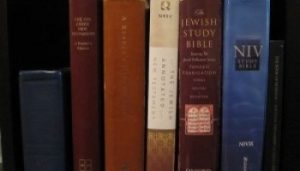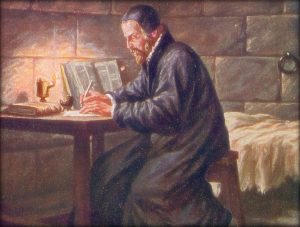
Shownotes
Wisdom-Trek / Creating a Legacy
Welcome to Day 1276 of our Wisdom-Trek, and thank you for joining me.
I am Guthrie Chamberlain, Your Guide to Wisdom
Mastering the Bible – Writers Used Translations – Worldview Wednesday

Wisdom – the final frontier to true knowledge. Welcome to Wisdom-Trek where our mission is to create a legacy of wisdom, to seek out discernment and insights, and to boldly grow where few have chosen to grow before.
Hello, my friend, I am Guthrie Chamberlain, your captain on our journey to increase wisdom and create a living legacy. Thank you for joining us today as we explore wisdom on our 2nd millennium of podcasts. This is Day 1276 of our trek, and it is Worldview Wednesday. Creating a Biblical worldview is important to have a proper perspective on today’s current events.
To establish a Biblical Worldview, you must also have a proper understanding of God and His Word. Our focus for the next several months on Worldview Wednesday is Mastering the Bible, through a series of brief insights. These insights are extracted from a book of the same title from one of today’s most prominent Hebrew Scholars, Dr. Micheal S. Heiser. This book is a collection of insights designed to help you understand the Bible better. When we let the Bible be what it is, we can understand it as the original readers did, and as its writers intended. Each week we will explore two insights.
Mastering the Bible – Writers Used Translations

Insight Twenty-One: The Biblical Writers Used Translations of the Bible
Dr. Heiser shares his own experience as a Bible teacher. He says, “When I was teaching full-time, I’d occasionally hear students lament having to read the Bible in translation. Some would even wonder if they could trust their translations. I would tell students they need not worry about the issue since biblical writers used them.”
Dr. Heiser was speaking primarily about how the New Testament writers quote the Old Testament. The New Testament was written in Greek. The Old Testament was written primarily in Hebrew, with a few portions written in Aramaic. When New Testament writers quote the Old Testament, they usually use something called the Septuagint, which was an ancient Greek translation of the Hebrew Old Testament.
It’s interesting to note that the Septuagint wasn’t always literal in its translation of the Old Testament. That didn’t bother the New Testament writers. For example, a pretty literal rendering of Amos [9:11]-12 reads like this,
“In that day I will restore the fallen house of David.
I will repair its damaged walls.
From the ruins, I will rebuild it
and restore its former glory.
And Israel will possess what is left of Edom
and all the nations I have called to be mine.
The Lord has spoken,
and he will do these things.”
In literal terms, the prophecy seems to be about repairing a physical structure, perhaps a tent booth (Deuteronomy [16:13]-16) or a wall. Many readers would anticipate the prophecy is about the rebuilding of David’s house or, by extension, his dynasty. The result would be the “what is left of Edom and all the nations” would be possessed by “house of David.”

Luke quotes this passage in Acts [15:16]-17 and the wording changes.
“Afterward I will return
and restore the fallen house of David.
I will rebuild its ruins
and restore it,
so that the rest of humanity might seek the Lord,
including the Gentiles—
all those I have called to be mine.
The Lord has spoken.”
Notice that Edom becomes “the rest of humanity” in Luke’s rendering, while “nations” become the more specific “gentiles.” The reason for the difference is that Luke is using the Septuagint. Edomites in the Old Testament were estranged relatives to Israel. In the context of Acts 15, because of Jesus, David’s heir, the gentiles, and everyone estranged from God can now be part of the people of God. The Septuagint translation actually makes the theological point of Amos 9 more clear, despite its “more than literal” wording.
The lesson is twofold: (1) the biblical writers were not afraid to use translations, so we shouldn’t be afraid either; and (2) sometimes literalism isn’t the best way to read something.
Insight Twenty-Two: The Creation Stories Target the Belief of Other Ancient Religions
Even people who never read the Bible know that it talks about the creation of the world. They have heard of Genesis 1:1, “in the beginning, God created the heavens and the earth.” Because of our current cultural climate, though, the verse, and even the idea is controversial to say the least. Our culture is a product of the seventeenth-century Enlightenment and the progress of science since then, particularly with respect to the rise of Darwin’s theory of evolution. None of that was in the mind of the biblical writers.
The creation stories in the Bible don’t aim to articulate modern scientific theories. By definition, they couldn’t, since they come from a premodern era. God wasn’t dispensing advanced knowledge either, since no one who received the Bible prior to the modern period would have understood it. The whole enterprise of inspiration was aimed at bringing people truths they could understand, not transmitting cryptic knowledge to an intellectual elite.
The creation stories were designed to teach crucial theological ideas. They were deliberately written in ways that take shots at foreign gods and their (alleged) creative powers. This effort is largely lost on us since most of what’s going on in this text can only be discerned by people who read Hebrew and, just as importantly, people who shared the same worldview of the writers.
What’s happening in Genesis 1 would have been obvious to anyone familiar with the competing creation stories from ancient Egypt, Babylon, and Canaan. For example, Genesis 1:1-3, which identifies God as the creator, follows the grammar, syntax, and themes of the Babylonian tale known as Enuma Elish, in which Marduk orders creation. The reference to “the deep” draws on Canaanite beliefs about the ordering of the world from the primeval waters. The same is true for creation passages outside Genesis. Psalm [74:12]-17 links creation to God’s slaying of a great sea beast. Ancient readers would have known that was a backhanded slap in the face to Baal, who defeats the sea dragon in Canaanite myths. The notion that God created by the spoken word (Genesis 1:3) is a direct attack on Egyptian creation beliefs preserved in The Memphite Theology, where the god Ptah was thought to speak everything into existence.

The biblical authors were clever and fearless in putting forth their fundamental theological claim: the world of human experience is the product of the creative power of the God of Israel and no other god, period. We process Genesis in light of our own age and intellectual battles. To do that is to impose a foreign context on the Bible. When critics chide the Bible for not being scientific, it is they who are ignorant. It is intellectually bankrupt to criticize something for not being what it was never intended to be. The claim of the biblical writers was a supernatural one, affirming the reality of a creator. We need that message, even more today than ever since the worldview of many cultures is predisposed to rejecting the idea of God.
That will conclude this week’s lesson on another two insights from Dr. Heiser’s book “Mastering the Bible.” Next Worldview Wednesday, we will continue with two additional insights. I believe you will find each Worldview Wednesday an interesting topic to consider as we build our Biblical worldview.
Tomorrow we will continue with our 3-minute humor nugget that will provide you with a bit of cheer and help you to lighten up and live a rich and satisfying life. So encourage your friends and family to join us and then come along with us tomorrow for another day of our Wisdom-Trek, Creating a Legacy.

If you would like to listen to any of our past 1275 treks or read the Wisdom Journal, they are available at Wisdom-Trek.com. I encourage you to subscribe to Wisdom-Trek on your favorite podcast player so that each day’s trek will be downloaded automatically.
Thank you so much for allowing me to be your guide, mentor, and, most of all, your friend as I serve you through the Wisdom-Trek podcast and journal.
As we take this trek together, let us always:
- Live Abundantly (Fully)
- Love Unconditionally
- Listen Intentionally
- Learn Continuously
- Lend to others Generously
- Lead with Integrity
- Leave a Living Legacy Each Day
I am Guthrie Chamberlain reminding you to Keep Moving Forward, Enjoy Your Journey, and Create a Great Day Everyday! See you tomorrow!